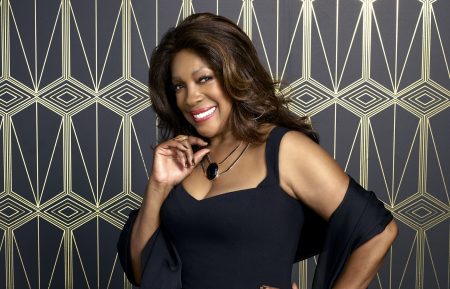Mary Wilson

Singer
Birth Date: March 6, 1944
Death Date: February 8, 2021 — 76 years old
Birth Place: Greenville, Mississippi
Bands: The Supremes
If Diana Ross was the crystalline lead voice of The Supremes, and Florence Ballard its fiery heart, then Mary Wilson was the legendary vocal group's soul, remaining faithful to their gorgeous harmonies and stage presence despite being relegated to a supporting role. As Detroit-area teenagers, Wilson joined forces with Ballard and Ross to form the Primettes, which struggled to gain the attention of Motown Records head Berry Gordy, Jr.
When they were finally signed to the label as The Supremes, Gordy changed the group from three voices on equal standing to Ross at the forefront and Wilson and Ballard as her backing singers. The group went on to become one of the biggest pop acts of the 1960s, with hits including "Stop! In the Name of Love," "Where Did Our Love Go?" and "Come See About Me," but as the decade wore on, their popularity waned, and Wilson was soon the sole original member after Ballard's dismissal and Ross's departure in 1969.
After the Supremes broke up in 1977, Wilson found later success as a musical theater performer. Her 1986 autobiography, Dreamgirl: My Life in the Supremes, did much to set straight the record regarding conflicts between Ross and the other Supremes, and Wilson remained the picture of professionalism in the face of two failed reunions that marred Ross' reputation. An elegant in her seventh decade as she was at the height of The Supremes' popularity, Mary Wilson served as proof positive that living well was indeed the best solution to a difficult situation.
Born March 6, 1944 in Greenville, MS, Mary Wilson was the eldest of three children by Sam and Johnnie Mae Wilson. Her family relocated numerous times throughout her early years before Wilson was sent to live with her uncle, John L. Pippin and his wife, Ivory, in Detroit, MI. Wilson came to believe that they were her biological parents, which confused her deeply when she was sent at the age of six to live with her mother.
Eventually, she settled in Detroit's notoriously tough Brewster-Douglass Housing Projects. There, she met Florence Ballard, another young girl who shared her love of R&B stars like Frankie Lymon. The pair soon became fast friends, and Ballard later tapped Wilson to join a female vocal group called the Primettes, which was manager Milton Jenkins' answer to the Primes, a male doo-wop act that included future Temptations Eddie Kendricks and Paul Williams.
In 1960, Ross' neighbor, Smokey Robinson, arranged an audition for the group with Berry Gordy, Jr., head of Motown Records. Though Gordy was impressed by their a capella harmonies, he refused to sign them to a contract until the members completed high school. The Primettes eventually waxed the single "Tears of Sorrow" for Lupine Records, but the record found few listeners. After replacing McGlown with Barbara Martin, the quartet haunted the Motown offices, where Mary Wells or Marvin Gaye occasionally tapped them to provide backing vocals or handclaps on singles.
Eventually, Gordy signed them to a contract, but on the condition that they change their names. The Primes had recently merged with another act, the Distants, to form the Temptations, which eliminated the need for a sister group. Ballard selected "The Supremes" from a list of possible names shortly before the group joined the Motown stable in early 1961.
The next two years were a difficult period for Wilson and the Supremes, who struggled to generate a Top 40 hit. Executives at the label began to lose their faith in the act until "When the Lovelight Starts Shining Through His Eyes" (1963), which rose to No. 23 on the Billboard singles charts. The following summer, they scored their first No. 1 with "Where Did Our Love Go?" (1964), which preceded a long, celebrated streak of hits, including four consecutive No. 1 songs: the Grammy-nominated "Baby Love," "Come See About Me, "Stop! In the Name of Love" "Back in My Arms Again." By the mid-1960s, the Supremes were Motown's reigning female vocal group, as well as one of its most successful acts.
But behind the Supremes' groomed, elegant veneer, a power struggle was brewing between the group and Gordy. Prior to their runaway success, lead vocal duties were always shared between the three members, but with their rise to fame came a shift in power, with Ross becoming the primary lead singer and Wilson and Ballard relegated to glorified backup singers. Ballard, who had essentially organized the Supremes, cried foul on the new arrangement, but found herself stonewalled by Gordy, who had become romantically involved with Ross.
His unilateral position was all but solidified by his 1966 decision to rename the group Diana Ross and The Supremes. Ballard soon fell into a depression before being ousted from the group in 1967. Two years later, Ross herself would leave The Supremes to pursue her own successful solo career, leaving Wilson the sole original member.
With Cindy Birdsong of Patti LaBelle's Bluebelles (later LaBelle) and Jean Terrell in place as the "new" Supremes, Wilson and the group enjoyed a brief string of Top 20 hits, including "Up the Ladder to the Roof" (1970) and "Stoned Love" (1970), but with Motown's move from Detroit to Los Angeles came a label-wide reorganization that shifted promotional attention away from established acts like the Supremes in favor of newer hit-makers like The Jackson Five. Wilson and her husband, Pedro Ferrer, would soon assume control of the group, which underwent numerous personnel changes between 1972 and 1976.
They would generate one final Top 40 hit, "I'm Gonna Let My Heart Do the Walking" in 1976 before disbanding after a 1977 concert in London. While Ross became one of the top recording acts of the late 1970s and early 1980s, Wilson struggled to establish herself as a solo performer. She remained with Motown, but only after a protracted legal battle over alleged mismanagement of the Supremes.
Wilson prevailed, but her eponymous solo debut in 1979 generated only minor success. The following year, she was released by the label while recording her second album, which prompted a move to Nightmare Records, an imprint that hoped to score hits with former Motown artists. However, her singles for that label failed to achieve any chart success.
Disillusioned by the pop music business, she segued into musical theater, where she enjoyed acclaim in productions of "Leader of the Pack" and "Sophisticated Ladies." As Motown reached the 25th anniversary of its inception, many of its classic acts were being embraced anew by the baby boomer demographic through the "Big Chill" (1983) soundtrack, which reached the Top 20 on the Billboard 200, and the rise of the "oldies" radio format in national markets.
However, the emotional wounds incurred by Wilson years before hampered several attempts by the label to reunite the Supremes. A 1982 attempt to bring together Wilson with Cindy Birdsong and early '70s Supreme Schierre Payne fell through, but the failure was quickly eclipsed by the debacle at the legendary 1983 NBC special, "Motown 25: Yesterday, Today, Forever." During the show's finale, Ross was joined onstage by Wilson and Birdsong, but became upset when the other former Supremes did not remain behind her in their classic fashion.
Ross allegedly shoved Wilson during the final moments of the number, which was excised from the original broadcast, but received widespread press attention, resulting in an outpouring of support for Wilson. In 1986, Wilson released her autobiography, Dreamgirl: My Life as a Supreme, which drew its title from the Broadway musical Dreamgirls, which in turn had been inspired by the Supremes' story.
The book rose to the top of the bestseller list on the strength of its tell-all tone in regard to the conflicts between Ross and the other Supremes. Its popularity revived Wilson's solo career, and she soon became a fixture of the casino circuit. She recorded a string of singles for both Atlantic and Nightmare (later Motorcity Records) between 1987 and 1989, but none saw the light of day. In 1988, she was inducted into the Rock and Roll Hall of Fame as a member of The Supremes.
Wilson enjoyed a second bestseller with 1990's Supreme Faith: Someday We'll Be Together, which detailed her life after the Supremes. However, chart success continued to elude her until 1995, when her single "U" earned respectable sales in the U.K. However, its success was soon overshadowed by news of a proposed Supremes reunion tour featuring Ross, Wilson and Cindy Birdsong.
The event appeared to be doomed from the start; though plans for the tour were announced in late 1999, Wilson did not even receive an offer until the end of the year. Even then, the terms seemed exceptionally callous: while Ross would receive $15 million for her participation, Wilson was offered $2 million with no creative control and Birdsong even less than that. Wilson countered with a $5 million payday, which was finally reduced to $4 million.
But when the "Return to Love" tour finally hit the road in 2000, neither Wilson nor Birdsong were onstage with Ross; instead, fans queuing up to see a Supremes reunion saw Ross with Lynda Laurence and Schierre Payne, two late-era Supremes who had never sung with Ross. Ticket sales plummeted, and the tour was eventually scrapped before completing its dates. For many of Wilson's fans, the debacle underscored the fact that Ross was not the whole of the Supremes.
In 2002, Secretary of State Colin Powell appointed Wilson as Culture-Connect Ambassador for the U.S. State Department, which required her to appear at international events sponsored by the agency. A year later, she and Birdsong reunited for "Motown 45" (ABC, 2004), with Kelly Rowland of Destiny's Child subbing for the conspicuously absent Diana Ross.
Wilson released her first live DVD, "Mary Wilson Live at the Sands" (2006), which was recorded at the Sands Hotel in Las Vegas. After undergoing an angioplasty that same year, she resumed her busy schedule of concerts, lectures and charity events. Wilson was also instrumental behind proposing a bill that banned imposter groups from performing under the name of established acts.
Her support was inspired in part by a 1997 lawsuit she filed against Kaaren Ragland, a singer who had performed with Wilson in the 1970s and later performed as part of a group called "The Sounds of the Supremes." Mary Wilson died on February 8, 2021 in Las Vegas, NV at the age of 76.
Credits

Access Daily

Tamron HallStream

Speak

The Knockout Game

60s Girl Grooves (My Music)

Mary Wilson: The Story of The Supremes

The Real

Home & Family

The Talk

Access Hollywood Live

Motown Memories (My Music)

My Generation

The One Show

Ambrose Bierce: Civil War Stories

Dancing With the StarsStream

Tavis Smiley

Only the Strong Survive

The View

227Stream

Tiger Town









